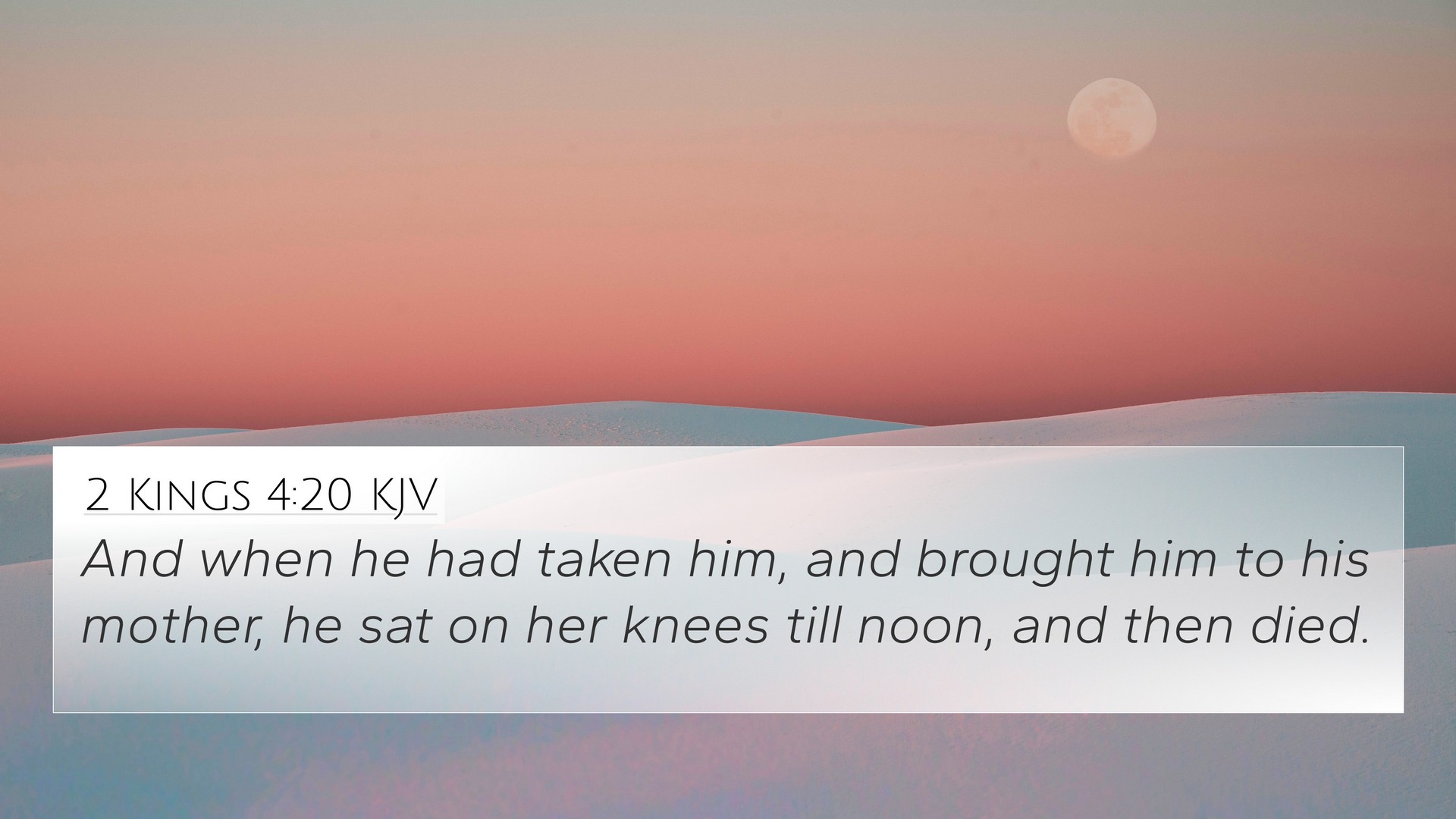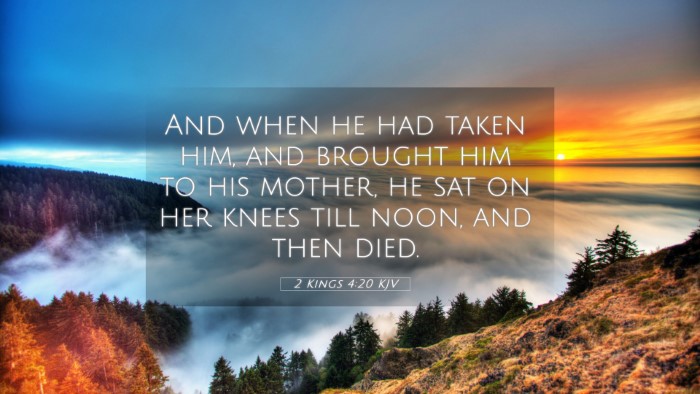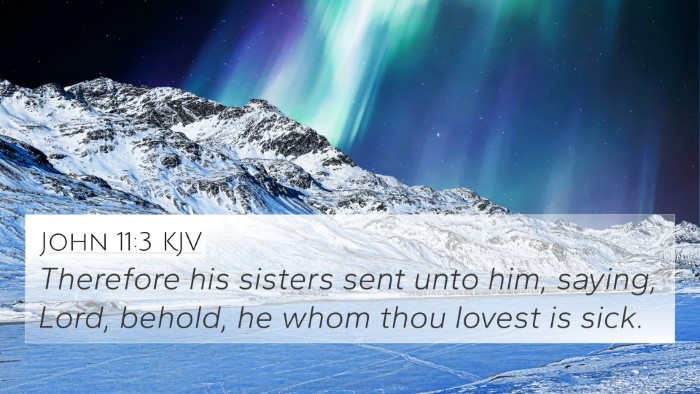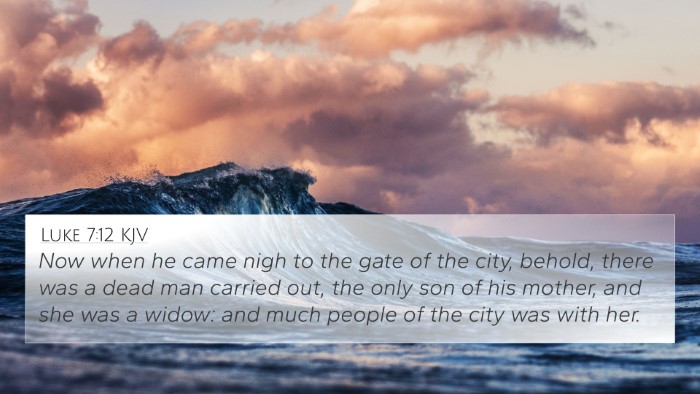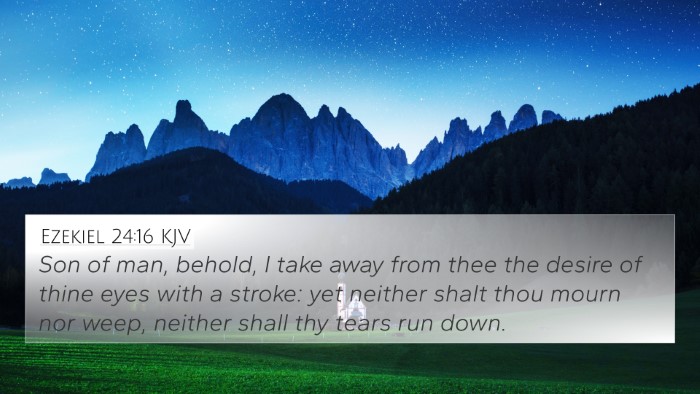Understanding 2 Kings 4:20
Verse: "And when he had taken him, and brought him to his mother, he sat on her knees till noon, and then died."
Overview: This verse captures a moment of immense grief and sorrow following the death of the Shunammite woman's son. It highlights the themes of maternal love, loss, and the deep emotional turmoil faced by those affected by sudden tragedy.
Commentary Insights
This verse can be deeply explored through insights from public domain commentaries. Here are combined perspectives from Matthew Henry, Albert Barnes, and Adam Clarke:
-
Matthew Henry:
Henry emphasizes the profound love and attachment of a mother towards her child. The child's death signifies not only the loss of life but also the collapse of hope for the mother, who had previously experienced a miraculous blessing through the prophet Elisha.
-
Albert Barnes:
Barnes provides a closer look at the cultural context of mourning in ancient Israel. He notes how the act of sitting on the mother’s knees signifies a place of comfort and connection, emphasizing the depth of the mother-son relationship. The death at noon further suggests the abruptness and unexpected nature of life's challenges.
-
Adam Clarke:
Clarke expands on the interpretation of the mother's role and responsibilities, observing that her sadness represents not just a personal loss but also a broader commentary on life's fragility. He underscores the significance of this moment within the narrative of Elisha's ministry, highlighting themes of hope amidst despair.
Cross-References and Thematic Connections
2 Kings 4:20 resonates with several other Biblical passages, reflecting on themes like grief, divine intervention, and the relationship between parents and children.
Related Bible Verses:
- 1 Kings 17:17-24 - Elijah raises the widow's son, paralleling Elisha's later miracle and indicating God's power over life and death.
- Luke 7:11-17 - Jesus raises the widow's son at Nain, showing continuity in the ministry of raising the dead and comforting the grieving.
- 2 Samuel 12:15-23 - David's mourning for his infant son illustrates the depth of parental grief.
- Matthew 9:18-25 - The story of raising Jairus' daughter reflects a similar context of devastation turned to joy.
- John 11:1-44 - The raising of Lazarus shows Jesus’ authority over death, linking to the miraculous themes in Elisha's time.
- Psalm 30:5 - "Weeping may endure for a night, but joy comes in the morning," connecting the themes of sorrow and hope.
- Proverbs 22:6 - The significance of nurturing children and their destinies can be crucial in understanding the mother's role.
Interpretative Analysis
This narrative not only highlights the intimate moment between mother and child but also sets the stage for Elisha's miraculous acts that follow, creating a connection between loss and restoration. The mother's immediate response upon the child’s death—holding him until noon—emphasizes a struggle that many believers face: the conflict between hope and despair.
Thematic Links:
- Emotional Connections: The depth of a mother's love and the pain of loss are central to understanding this passage.
- Divine Intervention: This verse is framed within a context of miraculous occurrences, underscoring God’s sovereignty over life.
- Hope Amidst Grief: Like several other narratives, it points towards the ultimate hope found in faith and divine assistance.
Tools for Bible Cross-Referencing
Understanding and exploring connections between scripture can greatly enhance the study of the Bible. Here are some tools and methods for effective cross-referencing:
- Bible Concordance: Use a concordance to find verses that relate to specific themes or keywords.
- Bible Reference Resources: Utilize reference guides that categorize verses by themes and connections.
- Cross-Reference Bible Study: Engage in studies that encourage comparative analysis of verses, such as thematic studies.
- Bible Cross-Reference System: Implement a system in your personal study plan that allows you to track related verses.
Conclusion
2 Kings 4:20 not only reflects a mother's profound sorrow but also opens up a dialogue about faith, hope, and the miraculous nature of God's interventions in times of despair. By leveraging cross-references and thematic connections, believers can deepen their understanding and appreciation of the scriptures, creating a richer dialogue between different Biblical texts.
For anyone seeking to uncover the layers of meaning in their study of the Bible, exploring the connections between scriptures found in passages like 2 Kings 4:20 is essential.
